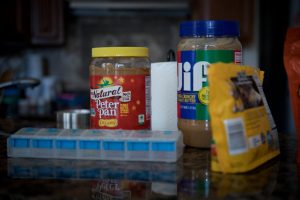Currently, roughly 2% of Canadian children are allergic to peanuts. Symptoms of children who are allergic to peanuts can range from redness and irritation of the skin to swelling and shortness of breath, which in extreme cases can lead to life-threatening circumstances requiring immediate medical attention.
Carter Grodi is one of the many children allergic to peanuts who has had to bring his own cupcake to birthday parties, had to learn to read food labels and turned 15 without once tasting a Kit Kat or Twix.

Figure 1. A few of the many products containing peanuts. Used with permission, © 2018 The New York Times
However, at the age of 16, Carter was able to taste the wonders of Kit Kat’s and Twix’s without having an allergic reaction. Carter had recently completed a yearlong clinical trial of oral immunotherapy where he was gradually exposed to increasing amounts of peanuts in hopes of reducing his sensitivity to peanuts.
This new drug, named AR101, was created by Aimmune Therapeutics. The active ingredient in AR101 is surprisingly peanut flour. The peanut flour is carefully measured and packaged into capsules which can be opened so that the peanut flour can be added into foods and consumed. Dr. Vickery, lead scientist of the study, said, “This trial has generated the highest quality evidence to date about whether oral immunotherapy works and how safe it is.”
The treatment itself can cause allergic reactions among participants. However, participants who complete the clinical trial are better able to handle an accidental exposure to peanuts. “You exchange that uncertain, unpredictable risk of having an accidental reaction that spirals out of control for these . . . mostly mild or moderate symptoms, that are manageable for most patients,” Dr. Vickery said.
The goal of this treatment is not to cure the allergy but instead to lower the risk that an accidental exposure to peanuts will cause a life-threatening reaction. Thus, allowing children with peanut allergies and their families to live without fear and anxiety of an accidental encounter with peanuts which could potentially lead to harm, or in worse cases, death.
This treatment has been life changing for Carter, who continues to eat small amounts of peanuts to maintain his low-level tolerance. He said, “I can go sit in a place another kid was the day before and not have to wipe off the desk, and not worry about what my friends are eating around me.” He then mentioned, “To me, a peanut was like a weapon, like you have a gun to your head and you could have the trigger pulled any time. There’s not really that gun anymore.”

Figure 2. Carter Grodi at home in Florida with his mother, Carolee. Used with permission, © 2018 The New York Times
AR101 has been named a breakthrough therapy. Plans are in motion for this drug to undergo priority review and to go through a quickened approval process. “It could be on the market by the end of 2019,” a spokeswoman said.
Trevor Shen
